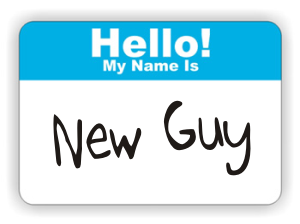After years of hiring freezes and budget cuts, we have been able to finally back-fill behind people who have retired years ago. And with work load increasing, and a decent budget, we are also able to hire some “entry level” positions to off-set our aging workforce. Often, our job openings are filled by others from within the organization, but those folks are too far advanced for entry-level positions. Now we are getting new staff that are young and eager…and new to the government. Here’s my advice for them.
 Group dynamics are a funny thing. You unknowingly build a sort of “equilibrium” among existing employees. Then change happens (as it always does) and the equilibrium shifts, but eventually returns with some nuances that weren’t there before. And then change happens again. Sometimes this change is a new supervisor, but more often (lately) it’s a new employee. In general, these employees are younger and more eager than our current staff. Often they are only with us temporarily as a “120-day detail” or a “Department of Army Intern” but sometimes they are hired permanently. I use the term “permanently” loosely, since these days it’s less common for an employee to stay in one place for decades. Sometimes we THINK a new employee is here to stay, but then another opportunity comes along and the employee leaves.
Group dynamics are a funny thing. You unknowingly build a sort of “equilibrium” among existing employees. Then change happens (as it always does) and the equilibrium shifts, but eventually returns with some nuances that weren’t there before. And then change happens again. Sometimes this change is a new supervisor, but more often (lately) it’s a new employee. In general, these employees are younger and more eager than our current staff. Often they are only with us temporarily as a “120-day detail” or a “Department of Army Intern” but sometimes they are hired permanently. I use the term “permanently” loosely, since these days it’s less common for an employee to stay in one place for decades. Sometimes we THINK a new employee is here to stay, but then another opportunity comes along and the employee leaves.
Here’s a few pieces of advice to ease the transition into the new job (and hopefully make some connections so you’ll want to stay):
Watch and observe for a while
I know you have a lot of college knowledge brimming over in your brain, but I think over the years I’ve learned just about as much on the job as I have while in college. Maybe other jobs are different, but in my office there are many procedures that just aren’t taught in school.
Find a mentor
Our agency doesn’t currently have a formal mentoring p rogram, but it should (and I think it’s in the works). When I started, the senior employees “unofficially” mentored the new employees. This is the best way to learn the ropes, especially the many computer-based procedures that we have to use. A mentor will also provide feedback, and ensure that work is done to the level of detail that’s anticipated. On a side note, having a mentor can also open doors to friendships and opportunities.
rogram, but it should (and I think it’s in the works). When I started, the senior employees “unofficially” mentored the new employees. This is the best way to learn the ropes, especially the many computer-based procedures that we have to use. A mentor will also provide feedback, and ensure that work is done to the level of detail that’s anticipated. On a side note, having a mentor can also open doors to friendships and opportunities.
Offer to share your talents
Often the areas that a new employee is strong in can be the same areas that a current employee struggles with (I’m thinking about certain computer programs here, but there may be other examples). Anyone with strengths in Excel and graphic programs would be a great asset to me!
Don’t worry so much
I remember being so impressed with how smart everyone was when I started, and I was so worried I wouldn’t be able to keep up. “Inch by inch, the job’s a cinch” as one of my mentors used to say, and truly you will learn and become a respected senior employee some day. And we all do make mistakes (and you will too) so just do your best and try not to think too much about keeping up with the senior staff.
Ask questions
This is key to learning in any new situation. Asking questions shows that you are interested, and more importantly, shows that you are interested in doing things in a manner that is expected in your office. I think there’s no such thing as a dumb question, so ask away!
Spend time with your co-workers
The most enjoyable work experience will result if you have friends in the office. As I’ve been discussing in my blogs on the decline of camaraderie, we need to make an effort to get to know one another if we want to keep morale up and enjoy the workplace.
So get to work now! And I hope you enjoy working here enough to stick around!
Becky Latka is part of the GovLoop Featured Blogger program, where we feature blog posts by government voices from all across the country (and world!). To see more Featured Blogger posts, click here.





Becky, thank you for these tips! Really helpful and I’ll definitely be jotting them down!
Thanks Francesca! Hope they help!